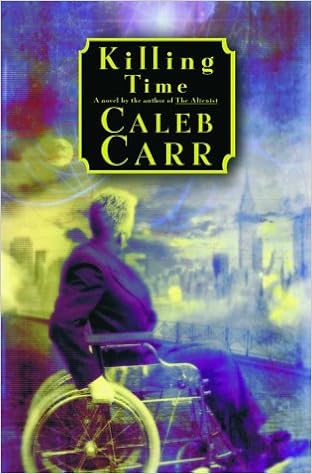|
Caleb Carr, Killing Time (Random House, 2000) Although Caleb Carr has been associated with genre movies before (he wrote the truly awful Warlord: Battle For the Galaxy travesty that Joe Dante foisted on us some years back), his literary works have previously all been historical mysteries (the superb Alienist and its tolerable sequel, Angel of Darkness) or non-fiction. Killing Time, his first genre novel, is as much a social commentary as it is a novel, and although it provides a fascinating glance at the slippery slope that our society may well be rolling down, his failure to create readable characters cripples the effectiveness of this novel.
When Wolfe gets information implying that the recent assassination of the U.S. president may have been staged, he gets drawn into a conspiracy that results in his meeting Larissa and Malcolm Tressalian, the brilliant and psychotic children of a rich computer genius who is clearly Bill Gates (Carr eschews any attempt at subtlety). With a stealth airship straight out of Jules Verne, they use their ability to manipulate information to attempt to change the world for the better, preventing wars, attempting to convince mankind to cut down on gambling and environmental destruction, etc. They have a rollicking good time until one of their faked stories causes a spy to turn terrorist, leading to a frantic attempt to prevent a nuclear disaster (for Carr, plot is only slightly more important than subtlety). The world and concept that Carr has created are fascinating, and would more than make up for the threadbare plot -- if there was any sense of character development. However, Carr's characters are unredeemingly two-dimensional, and hardly work even as archetypes. In a clear attempt at fantasy-fulfillment, Wolfe/Carr ends up in bed with the beautiful and deadly Larissa, even though we're not given the slightest reason why she is attracted to him (other than her psychosis). The assorted revolutionaries are given cookie-cutter traits that are meant to make them distinct: this one is a biologist, that one likes whores. But since they sound alike and act alike, who cares when one dies? As it stands, Killing Time is a monumental disappointment from a once-promising author. Given another hundred pages or so (this novel is less than half as long as The Alienist), Carr might have fleshed out the characters and plot enough to create a readable novel. As it stands, the best thing Carr could have done with his admittedly intriguing view of the future would have been condensing it into an essay and publishing it in a magazine like The Atlantic. The feeble characters and plot undermine any attempt at allegory or satire he might have been hoping to accomplish, and a brilliant vision of the future of the information age thus becomes barely readable tripe. 
|
 Rambles.NET book review by Adam Lipkin 6 May 2001 Agree? Disagree? Send us your opinions!  



 |

